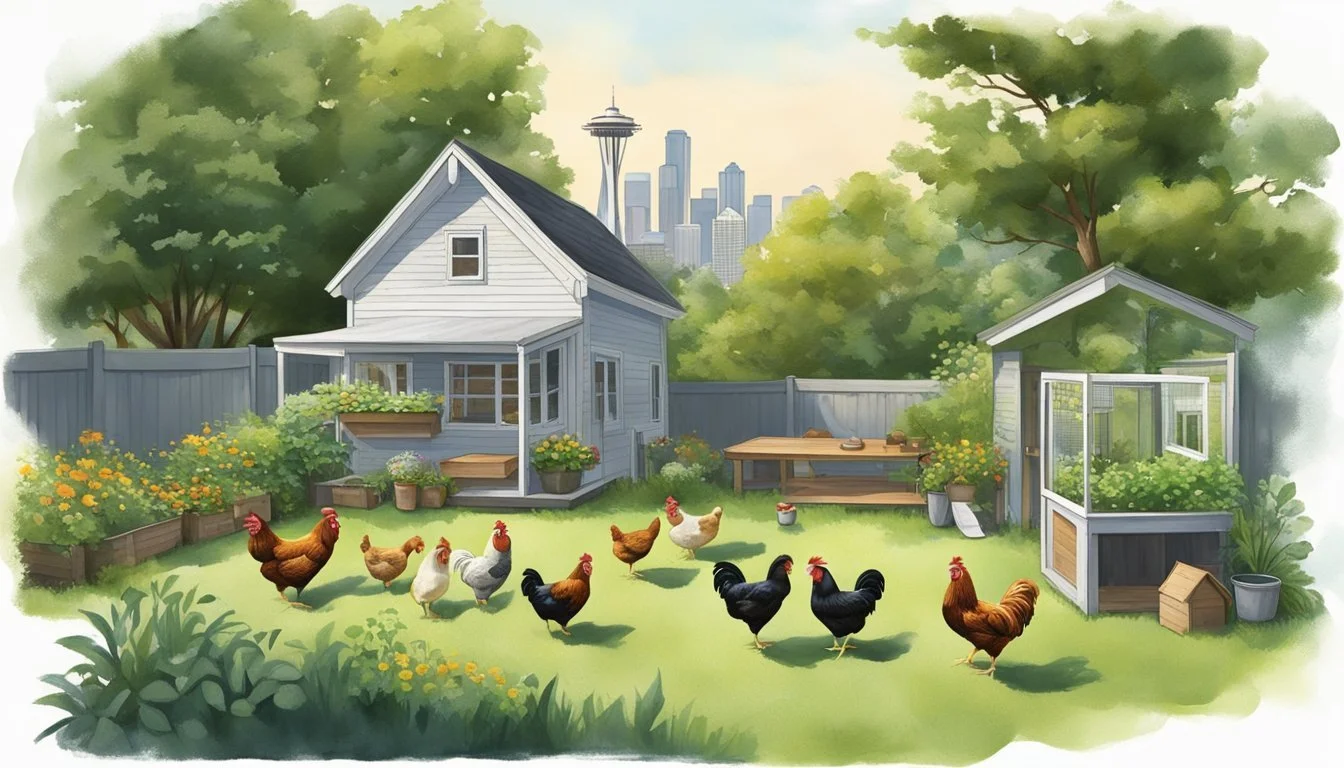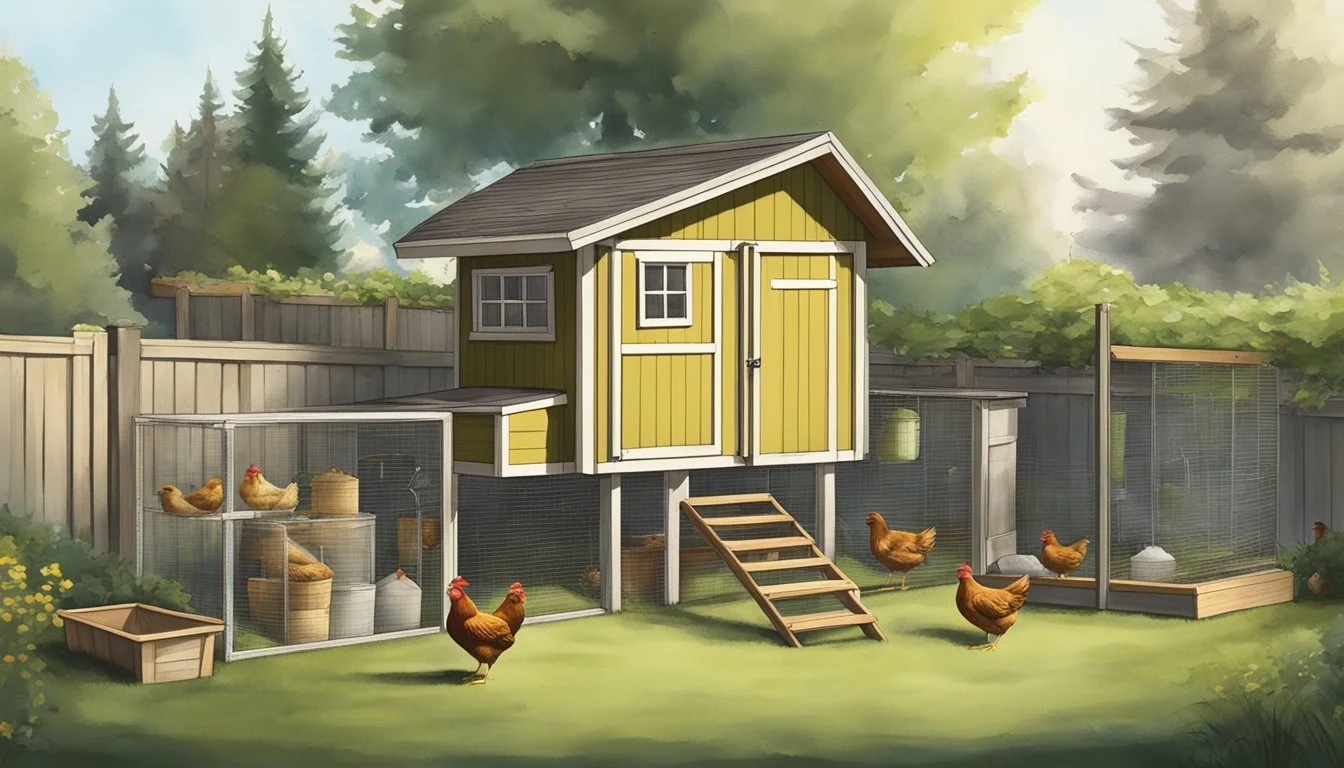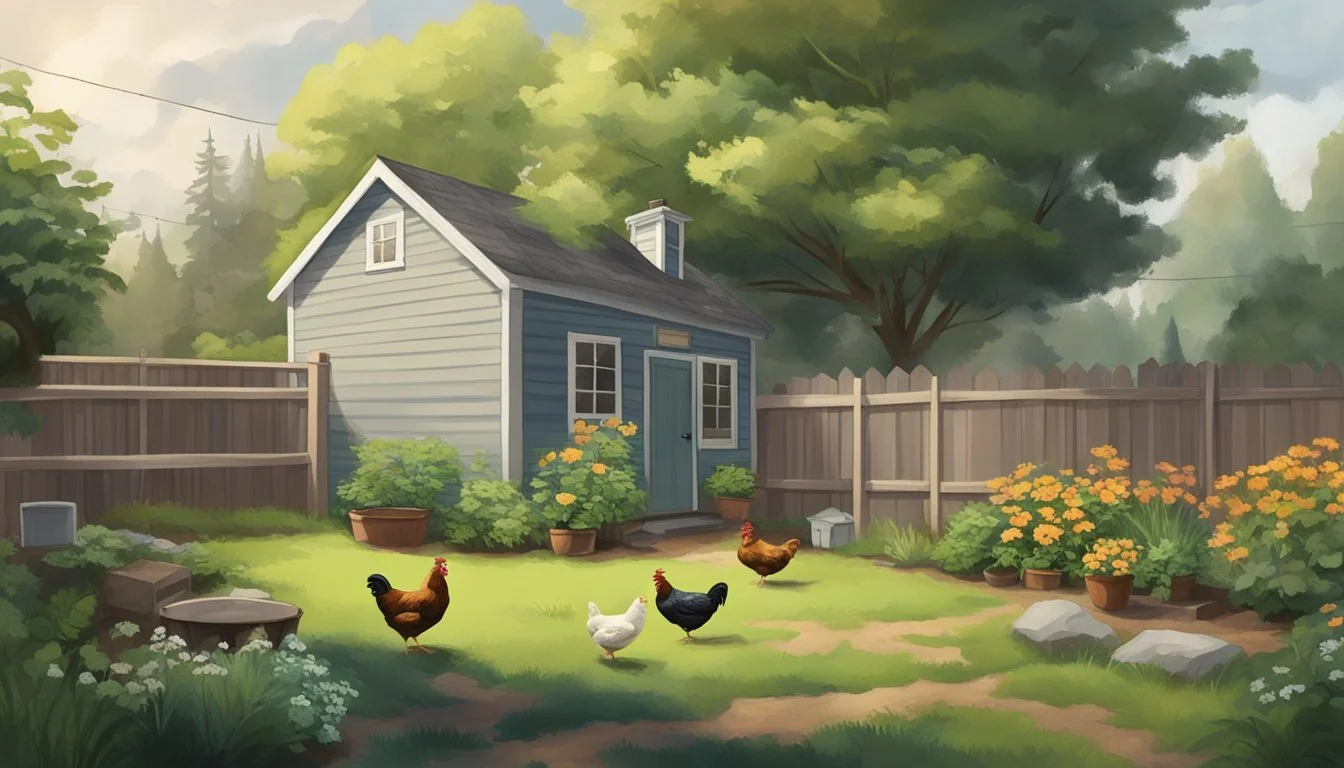Keeping Backyard Chickens in Seattle, WA
Urban Poultry Essentials
Backyard chicken keeping has become a popular practice in urban locales, offering residents of Seattle, Washington, a way to connect with their food sources and enjoy the benefits of fresh eggs. The city permits its residents to keep up to eight chickens on any city lot, allowing individuals to engage in small-scale poultry farming that brings a piece of the countryside into the urban environment.
Seattle's regulations reflect a balance between urban living and the increasing interest in local food and sustainability. For those living on lots larger than 10,000 square feet, additional hens are allowed—one for every additional 1,000 square feet of lot area—especially if the property includes a community garden or urban farm. This progressive attitude towards urban agriculture demonstrates Seattle's dedication to fostering eco-friendly practices and food responsibility within city limits.
As with any form of animal husbandry, the city clearly defines requirements to ensure a harmonious existence between chicken keepers and their neighbors. Coops must be properly constructed and positioned at least 10 feet away from property lines, promoting clean and ethical living conditions for the chickens while minimizing any potential disturbances to nearby residents. These measures reassure those considering backyard chickens that, with care and attention to the local ordinances, they can successfully integrate this self-sufficient practice into their Seattle lifestyle.
Understanding Seattle's Chicken Keeping Ordinances
Seattle residents interested in urban poultry farming should be familiar with the specific ordinances and regulations. The city's laws are designed to manage the harmonious coexistence of backyard chickens within urban environments.
Legal Framework for Urban Poultry
In Seattle, the legal framework governing the keeping of chickens in urban areas is established by municipal laws, which align with Washington State's guidelines and the local jurisdiction's health and zoning standards. These laws are pertinent for maintaining order and ensuring the welfare of both chickens and residents.
State Department of Agriculture: Provides overall guidelines for poultry farming.
Local Chicken Laws: Reflect the city-specific bylaws within Seattle's jurisdiction.
Permit Requirements and Restrictions
Seattle does not require a special permit for keeping backyard chickens, provided that homeowners comply with the set restrictions:
Maximum Chickens Allowed: 8 hens per lot
Roosters: Prohibited due to noise concerns
Residents must adhere to these limits without exception. Any deviation could result in penalties or the removal of the animals.
Zoning and Lot Size Regulations
Zoning laws and lot size regulations determine the appropriate placement of chicken coops in relation to dwelling units and property lines. Seattle's Land Use Code has specifics that must be followed:
Coop Location: Coops must be at least 10 feet away from any dwelling units on adjacent lots.
Lot Size: No specific lot size is required; however, the coop must meet certain distance requirements from lot edges and neighboring structures.
These regulations are crucial to minimize potential disputes and to ensure that chickens have a suitable living environment, while also keeping public health and safety considerations in check.
Choosing the Right Location and Coop
Before inviting backyard chickens into your life, it's essential to ensure their home is both safe and suitable. The location and design of the chicken coop are crucial to their well-being and your ease of maintenance.
Selecting a Suitable Spot in Your Yard
When selecting a location in your yard for a chicken coop, consider the following:
Sunlight: Chickens require regular sunlight, so position the coop in a well-lit area of the yard.
Drainage: Ensure the chosen spot has good drainage to avoid water accumulation that could lead to unhealthy conditions.
Accessibility: Choose a spot that's easily accessible year-round, considering Seattle's seasonal rain.
Distance from Neighbors: To maintain good relationships with neighbors and adhere to zoning regulations, place the coop at least 50 feet away from your property line.
Coop Design and Size Considerations
The design and size of the chicken coop must reflect the number of chickens and their needs:
Space Requirements:
Minimum of 3 square feet per chicken inside the coop.
Provide 8-10 square feet per chicken in an outdoor run.
Ventilation and Insulation: Proper ventilation is key, as is insulation, to protect against Seattle's cooler temperatures.
Nesting Boxes: Supply one nesting box per every three hens, with easy access for egg collection.
Protecting Chickens from Predators
Protective measures are non-negotiable to keep the chickens safe from local predators like raccoons and rodents:
Fencing: Surround the coop and run with sturdy fencing dug at least 12 inches into the ground.
Secure Latching: Coops should have secure latching mechanisms that predators can't easily open.
Hardware Cloth: Replace chicken wire with hardware cloth for windows or open ventilation spots to prevent smaller pests from entering.
Regular Maintenance: Inspect and maintain the coop regularly to prevent any gaps or damage that could invite predators.
The Basics of Chicken Care
Caring for chickens in Seattle requires an understanding of proper feeding, maintaining health, and coop cleanliness. Each aspect is essential for a productive and happy flock.
Feeding and Nutrition
Chickens require a balanced diet to stay healthy and lay quality eggs. In Seattle, a typical hen's feed should comprise:
Layer pellets: A staple providing most nutritional needs.
Grit: To help hens digest their food properly.
Calcium supplements: Such as oyster shells, to ensure strong eggshells.
An average hen will consume roughly 1/4 pound of feed per day. Feed prices vary, but a 50-pound bag of quality chicken feed averages around $20 and its duration depends on the flock size.
Health, Wellness, and Disease Prevention
Regular health checks are crucial for disease prevention. Seattle's chicken owners should note:
Vaccinations: Essential for preventing common poultry diseases.
Parasite control: Regular inspections for signs of lice or mites.
Observation: Monitor for any changes in behavior or appearance, signaling potential health issues.
Hens in their prime laying period, which is the first few years of life, may lay 180-320 eggs annually. Factors influencing this include breed, diet, and overall wellness practices.
Hygiene and Coop Cleanliness
For hygiene and disease prevention, coops in Seattle must be at least 10 feet from any residence or adjacent lot and cleaned regularly. Maintenance includes:
Daily: Removal of droppings and refreshing water.
Weekly: Bedding should be turned over and dirty spots removed.
Monthly: A thorough clean of the coop, including disinfection.
Chickens are sociable; overcrowding can lead to stress and pecking, so space is also a part of cleanliness. Adequate ventilation is necessary to keep the ammonia levels low and the air fresh inside the coop.
Interacting with Neighbors and Community
Keeping backyard chickens in Seattle requires thoughtful interaction with neighbors and the community. Ensuring good relations involves managing noise and odors, engaging in community education, and addressing wildlife concerns proactively.
Managing Noise and Odor
Residents should mind noise ordinances specific to Seattle when keeping chickens. Hens typically make less noise than roosters, which are prohibited in Seattle. However, noise can still be an issue. To mitigate this:
Build coops away from neighboring homes
Maintain clean living spaces for chickens to reduce noise and prevent foul odors
Regular cleaning reduces the risk of odors that might disturb neighbors. This includes:
Removing waste promptly
Using proper bedding, such as straw or wood shavings
Community Engagement and Education
Sharing knowledge about proper chicken care can foster a positive neighborhood dynamic. This might involve:
Organizing meetings with neighbors to address any concerns and share care practices
Collaborating with community gardens to offer educational workshops about sustainable living with chickens
Addressing Concerns About Attracting Rodents and Other Wildlife
Chickens can attract unwanted wildlife, like rats or stray dogs. Measures to mitigate this include:
Storing feed in secure, rodent-proof containers
Ensuring the chicken coop and run are well-fortified against predators like hawks
Regularly inspecting the coop for any breaches that might allow access to attracting rodents or other wildlife
The Joys and Benefits of Raising Chickens
Raising backyard chickens in Seattle, WA, connects residents with the rhythms of nature and the tangible rewards of sustainable living. From the unparalleled taste of fresh eggs to the educational aspects for all ages, the advantages touch every facet of life.
Fresh Egg Production
Backyard chickens are a source of fresh, organic eggs that surpass anything found at the grocery store. The number of chickens an individual can keep may vary by specific area regulations, but generally, even a small flock can produce enough to satisfy a household's needs. Seattle residents enjoy eggs that are:
Nutrient-rich: Home-raised chickens often have a diverse diet which can lead to eggs with a richer nutritional profile.
Fresher: Eggs from one's own coop can be consumed within days of being laid, ensuring maximum freshness.
Contributing to a Sustainable Lifestyle
Chickens contribute substantially to a sustainable urban farm model. They reduce food waste by consuming kitchen scraps and also help in controlling pests like slugs and other insects naturally. Their droppings are rich in nitrogen, making excellent compost to enrich the soil in gardens. Key sustainable contributions include:
Pest control: Chickens feed on slugs and insects, reducing the need for chemical pesticides.
Compost creation: Chicken waste can be used to create compost, enhancing soil health in gardens.
Educational Opportunities for Children and Adults
Educational programs in Seattle often offer classes on the care and keeping of backyard chickens. These classes are valuable for children and adults alike, offering lessons on responsibility, biology, and the importance of caring for domestic fowl. Residents can learn about:
Animal husbandry: Gaining practical skills in caring for chickens.
Agricultural education: Understanding egg production cycles and the role of chickens in a suburban ecosystem.
Keeping chickens in Seattle can be both a joyful endeavor and a valuable contribution to a more sustainable and educationally enriched lifestyle.
Additional Considerations
Prior to starting a backyard chicken operation, understanding Seattle's specific rules about flock size and other fowl, using local resources for support, and navigating your space in relation to wildlife and neighbors are important steps.
Understanding the Limitations on Flock Size
Seattle permits up to 8 domestic fowl on any city lot without regard to the size of the lot. However, for lots greater than 10,000 square feet that either host a community garden or an urban farm, there is an allowance of one additional fowl for every additional 1,000 square feet of land utilized for these purposes. Though roosters are not permitted due to noise concerns, this can provide a means of increasing flock size for those who have the available space and desire to do so.
Exploring Options for Keeping Other Fowl
Residents interested in diverse types of poultry should note that general regulations for domestic fowl often apply to ducks and geese as well. Like chickens, ducks can be a valuable addition to your urban farm or community garden. However, their needs differ, so careful consideration of the infrastructure and care requirements is essential. It's imperative to respect property lines and the potential impact on neighbors and local wildlife when keeping ducks or geese.
Leveraging Local Resources and Expertise
Organizations like Seattle Tilth provide guidance for backyard poultry enthusiasts. They can help both seasoned and novice chicken keepers with selecting appropriate breeds, such as pullets or fully grown hens, based on their situations. Local resources also often include education on maintaining a clean, sanitary environment for your chickens, vital for preventing disease and ensuring the welfare of your flock as well as any small animals in close proximity to the residential structure.







